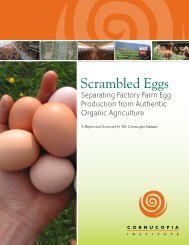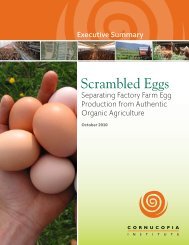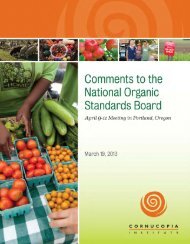“Behind the Bean” (pdf) - Cornucopia Institute
“Behind the Bean” (pdf) - Cornucopia Institute
“Behind the Bean” (pdf) - Cornucopia Institute
You also want an ePaper? Increase the reach of your titles
YUMPU automatically turns print PDFs into web optimized ePapers that Google loves.
Commitment to Transparency and Openness<br />
Or g a n i c c o n s u m e r s w a n t t o feel c o n n e c t e d to <strong>the</strong>ir food, <strong>the</strong>y want <strong>the</strong> story behind <strong>the</strong>ir food, and<br />
above all, <strong>the</strong>y want to know that <strong>the</strong>y are buying a product that was grown with respect for <strong>the</strong> environment<br />
and family farmers.<br />
In <strong>the</strong> marketplace, organic food does cost more than conventional food. When consumers pay more, <strong>the</strong>y consider <strong>the</strong><br />
extra dollars that <strong>the</strong>y invest to be well spent—a contribution to a food system that is sustainable, environmentally friendly,<br />
and economically just. The following words are taken from a soy supplier’s web site and aptly capture how some companies<br />
consider organics to be just a marketing strategy to increase profitability:<br />
Smart processors are catching <strong>the</strong> [organic] wave,<br />
and riding it to <strong>the</strong> increased profits brought by<br />
value-added organic foods. An organic label commands<br />
a premium price, and implies increased<br />
social responsibility for a brand. Quite simply,<br />
organic means smart marketing [emphasis added].<br />
16<br />
Note also that this supplier writes that organic<br />
“implies” increased social responsibility—actual<br />
commitment to social responsibility presumably<br />
does not matter, as long as <strong>the</strong> company can appear<br />
to be socially responsible and use this as a<br />
marketing tool.<br />
Photo courtesy of Midwest Organic Farmers Cooperative<br />
Companies that did not wish to share<br />
certain basic information with The<br />
<strong>Cornucopia</strong> <strong>Institute</strong>, such as where <strong>the</strong>ir<br />
soybeans were sourced, are missing a key<br />
point of <strong>the</strong> organic movement: consumers<br />
want to feel connected to <strong>the</strong>ir food, <strong>the</strong>y<br />
want <strong>the</strong> story behind <strong>the</strong>ir food, and above<br />
all, <strong>the</strong>y want to know that <strong>the</strong>y are buying a<br />
product that was grown with respect for <strong>the</strong><br />
environment and family farmers.<br />
The National Organic Program may be overseen<br />
by <strong>the</strong> USDA’s Agricultural Marketing Service,<br />
but few organic consumers and organic farmers<br />
see organic production as purely a marketing<br />
tool. The organic label indicates that <strong>the</strong> food<br />
was produced in accordance with <strong>the</strong> federal organic<br />
standards. When a company follows <strong>the</strong><br />
organic standards and respects <strong>the</strong> letter and<br />
<strong>the</strong> spirit of <strong>the</strong> law, <strong>the</strong> organic word and label<br />
should indeed act as an encouragement for<br />
conscientious consumers to purchase that product.<br />
But companies that use <strong>the</strong> organic label or<br />
o<strong>the</strong>r organic claims must act in socioenvironmentally<br />
conscious ways. It has become too easy<br />
for companies to claim to be organic and green,<br />
while placing <strong>the</strong>ir profits before <strong>the</strong>ir social and<br />
environmental commitments.<br />
Companies that did not wish to share certain basic<br />
information with The <strong>Cornucopia</strong> <strong>Institute</strong>,<br />
such as where <strong>the</strong>ir soybeans were sourced, are<br />
missing a key point of <strong>the</strong> organic movement:<br />
consumers want to feel connected to <strong>the</strong>ir food,<br />
<strong>the</strong>y want <strong>the</strong> story behind <strong>the</strong>ir food, and above<br />
all, <strong>the</strong>y want to know that <strong>the</strong>y are buying a<br />
product that was grown with respect for <strong>the</strong> en-<br />
12 Behind <strong>the</strong> bean: The Heroes and Charlatans of <strong>the</strong> Natural and Organic Soy Foods Industry.





